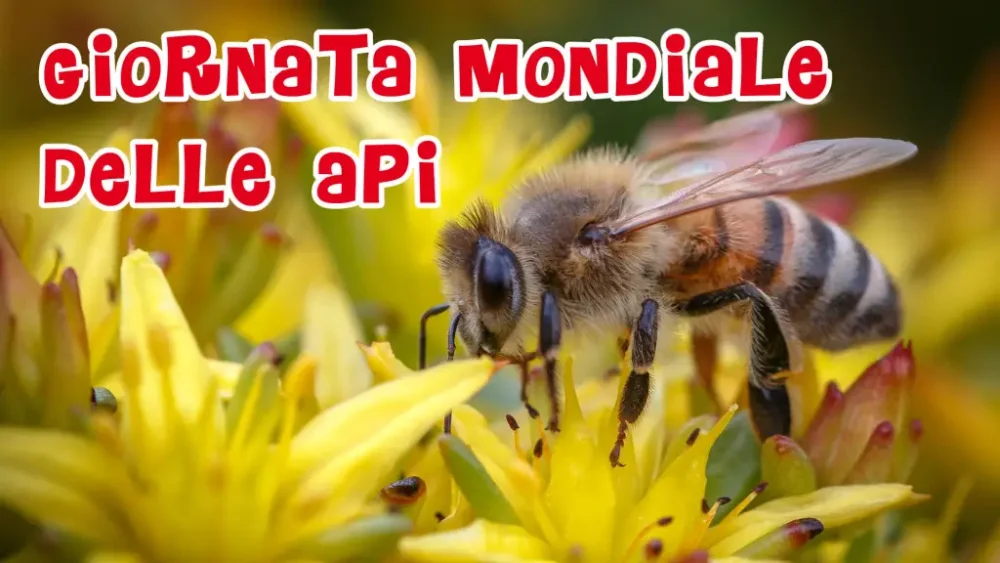IN RECENT YEARS, THE HABITAT OF BEES HAS BEEN THREATENED BY VARIOUS CAUSES, INCLUDING THE EXCESSIVE USE OF PESTICIDES, CLIMATE CHANGE AND THE LOSS OF NATURAL HABITATS. ON THE OCCASION OF WORLD BEE DAY, TO BE HELD ON MAY 20, NATIVA, THE FIRST BENEFIT COMPANY IN EUROPE AND THE FIRST B CORP IN ITALY (DECLARATION ATTESTING THE COMPANY’S COMMITMENT TO ENVIRONMENTAL AND SOCIAL ISSUES) HAS LAUNCHED THE “IT’S NEVER TOO EARLY” CAMPAIGN
It’s never too early to act
The apipollinating insects, are essential for ecosystem balance, biodiversity and our very existence, since almost 90% of wild flowering plant species and over 75% of the world’s food crops depend on animal pollination .
To protect them, the UN has established World Bee Day, an event that has been held annually since 2017.
The theme chosen for the 2024 Day, “Bee engaged with youth”, highlights the importance of involving young people in the conservation of bees and pollinators, recognizing them as future guardians of the environment. This youth involvement is crucial to ensuring that future generations are aware of the importance of protecting pollinators and the positive impact this can have on the environment and society as a whole.
To promote the protection of these precious insects and other pollinators and to make urban spaces more sustainable, Nativa has launched the campaign “It’s never too early“. What does it predict?
Wildflower “pushers”: a green revolution for bees and insects
In collaboration with Supernaturale (change-over agency specializing in environmental consultancy and marketing, committed to guiding companies in the transition towards a “Nature Positive” model, Nativa will “peddle” packs of wild flowers for free in Rome and Milan until 20 May 2024.
Don’t worry: they won’t be distributing drugs, but rather packets of wild flower seeds, such as marigold, flax, nasturtium and nigella.
Objective to promote biodiversity and eco-sustainability.
This initiative will not only make urban environments more beautiful and colourful, but will also offer important nourishment for bees and pollinating insects, helping them to survive and play their crucial role in the ecosystem.
«This – say Paolo Di Cesare and Eric Ezechieli, co-founders of Nativa -, it’s our way of reminding each of us how to experience our urban environments and make them as natural as possible. Supporting pollinators is essential not only to preserve biodiversity but also to safeguard global food security”.
The sowing of wild flowers is not just a symbolic gesture, but a real “ecological strategy” low price. Widespread in urban centres, it can counteract the decline of pollinators, preserve the ecosystem, improve air quality and beautify outdoor environments. But there’s more.
Driving change towards a sustainable future

On the occasion of the launch of the campaign, “It’s never too early”, the new website nonemaitropopresto.com, online from 20 May, will present the project and introduce Spaceship 2.0, an ESG (Environmental, Social and Governance) software, which aims to make the sustainability path of SMEs (Small and Medium Enterprises) more inclusive and accessible.
«Spaceship 2.0 aims to equip Italian SMEs with advanced tools, offering plans and paths that guide them towards responsible management of the environment and the community”underline the co-founders of the regenerative design company.
For over a decade, Nativa has in fact been trying to accompany Italian and European companies in the transformation of their business models, orienting them towards sustainability and regeneration. With constant commitment, B-Corp has contributed to accelerating this transition, placing values such as the environment and community at the center.
«Today’s consumers are not only looking for quality products, but also companies committed to protecting the planet»conclude Paolo Di Cesare and Eric Ezechieli.
In short, it’s never too late! Each of us can make a difference, even with small gestures such as planting flowers that attract bees in our gardens or balconies, avoiding the use of harmful pesticides and supporting policies and initiatives in favor of the conservation of pollinators.
Let us always remember that, just as bees work together for the good of the community, we too can join forces to ensure a better future for them and for all of us.

